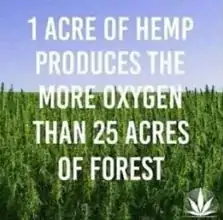Comback Daily argues that with two crops per year and with more efficient C4 photosynthesis ...
The claim is based on the false premise that Cannabis species use C4 photosynthesis.
Several of the grasses use C4 photosynthesis. Despite its nickname, Cannabis species are not members of the grass family. They are members of the Cannabaceae family, all of which use C3 photosynthesis (the same mechanism used by most trees). No member of the Cannabaceae family is listed in a very extensive list of C4 plants [Sage], and the photosynthesis in Cannabis sativa is consistent with C3 photosynthesis rather than C4 photosynthesis [Chandra].
References:
Chandra, Suman, et al. "Photosynthetic response of Cannabis sativa L., an important medicinal plant, to elevated levels of CO 2." Physiology and Molecular Biology of Plants 17.3 (2011): 291-295.
Sage, Rowan F. "A portrait of the C4 photosynthetic family on the 50th anniversary of its discovery: species number, evolutionary lineages, and Hall of Fame." Journal of Experimental Botany 68.2 (2017): e11-e28.
